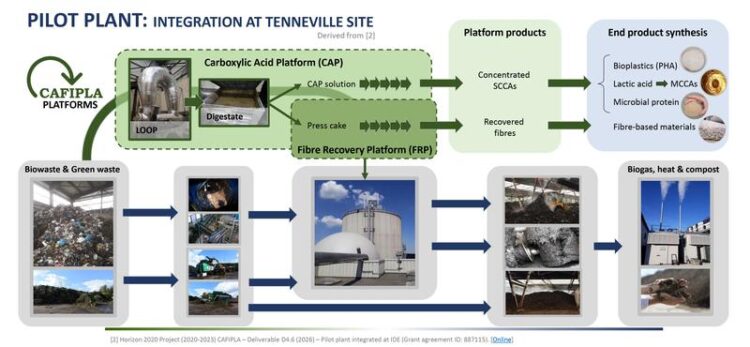CAFIPLA project develops innovative biomass pretreatment process for the bioeconomy

Bio-waste recycling in CAFIPLA-LOOP
(c) CAFIPLA/Deliverable D4.6
The use of biomass for the bioeconomy has so far focused primarily on sugar- or starch-based raw materials, which are associated with high environmental costs in terms of land use and energy and resource consumption. Against this background, the aim of the “CAFIPLA” research project with the participation of the DBFZ was to use at least 80 per cent biogenic waste from households as mixed input biomass for the production of platform chemicals and for fibre recovery. To this end, the project was able to implement a pragmatic approach for the pre-treatment of biomass.
In the three-year EU project “Combining carboxylic acid production and fibre recovery as an innovative, cost-effective and sustainable pre-treatment process for heterogeneous bio-waste” (CAFIPLA), the potential of biogenic waste streams as feedstock for the bioeconomy was developed. In contrast to current bioeconomy systems, which are dominated by sugar-based conversions, the CAFIPLA project relies on a combination of a carboxylic acid platform (CAP) and a fibre recovery platform (FRP) to upgrade biomass into biochemicals, bioproducts, feed and biomaterials.
In the pilot plant built in Teneville (southern Belgium), two fractions of biomass (dry and wet) can be fermented or processed into fibre in parallel in the so-called “CAFIPLA LOOP”. The “wet route” ferments the biomass, the digestate is then pressed and filtered. The resulting liquid is an SCCA concentrate, which serves as a feedstock for the production of bioplastics, medium-chain lactic acids and microbial protein. The short-chain carboxylic acids can also be processed into microbial protein powder for food and feed additives and fertilisers. The fibre residues of the fermentation residue as well as shredded green and paper waste serve as an additive for biogenic dressing materials, insulation and insulating materials, which are obtained from green waste via the “dry route”.
As project partners, DBFZ scientists have mapped and quantified technically and legally usable biomasses around the pilot plant. A dashboard, the EU Potential Atlas (see link below), was also developed for the EU-wide establishment of the technology. The interactive tool not only visualises the areas with high theoretical potential of the individual biomasses, but also indicates the development over time from 2010 to 2020 of the quantities and compares regions. The user can choose between countries (NUTS 0) and municipalities (NUTS 3) throughout Europe.
In the course of the biomass screening, DBFZ scientists also examined the socio-economic aspects of the supply chain from the biomass source to the CAFIPLA LOOP. For this purpose, workshops were held with waste companies, biomass owners, scientists, technology companies, organisations in the field of biomass use and political decision-makers. In particular, the unclear and repeatedly changing legislation in the EU, but also in individual regions, stood out as an obstacle to a faster establishment of new bio-waste utilisation paths. In addition, according to the scientists involved, certification procedures are needed to ensure compliance with standards for waste-based products and to create the acceptance of the population that is still lacking.
Project page:
https://cafipla.eu/
EU Potential-Atlas (BETA):
https://datalab.dbfz.de/resdb/maps?lang=en
Method paper on biomass potential (preprint):
https://essd.copernicus.org/preprints/essd-2023-179/
Recomendation Paper on how biowaste can be better used in the future:
https://www.mdpi.com/2071-1050/15/17/13147
Smart Bioenergy – innovations for a sustainable future
The DBFZ works as a central and independent thinker in the field of energy and material use of biomass on the question of how the limited available biomass resources can contribute to the existing and future energy system with sustainability and high efficiency. As part of the research the DBFZ identifies, develops, accompanies, evaluates and demonstrates the most promising fields of application for bioenergy and the especially positively outstanding examples together with partners from research, industry and public. With the scientific work of the DBFZ, the knowledge of the possibilities and limitations of energy and integrated material use of renewable raw materials in a biobased economy as a whole should be expanded and the outstanding position of the industrial location Germany in this sector permanently secured – www.dbfz.de/en.
Wissenschaftliche Ansprechpartner:
Susann Günther
Phone: (0)341 2434-589
E-Mail: susann.guenther@dbfz.de
Weitere Informationen:
https://www.dbfz.de/en/press-media-library/press/press-releases/cafipla-project-…
Media Contact
All latest news from the category: Process Engineering
This special field revolves around processes for modifying material properties (milling, cooling), composition (filtration, distillation) and type (oxidation, hydration).
Valuable information is available on a broad range of technologies including material separation, laser processes, measuring techniques and robot engineering in addition to testing methods and coating and materials analysis processes.
Newest articles

First-of-its-kind study uses remote sensing to monitor plastic debris in rivers and lakes
Remote sensing creates a cost-effective solution to monitoring plastic pollution. A first-of-its-kind study from researchers at the University of Minnesota Twin Cities shows how remote sensing can help monitor and…

Laser-based artificial neuron mimics nerve cell functions at lightning speed
With a processing speed a billion times faster than nature, chip-based laser neuron could help advance AI tasks such as pattern recognition and sequence prediction. Researchers have developed a laser-based…

Optimising the processing of plastic waste
Just one look in the yellow bin reveals a colourful jumble of different types of plastic. However, the purer and more uniform plastic waste is, the easier it is to…



